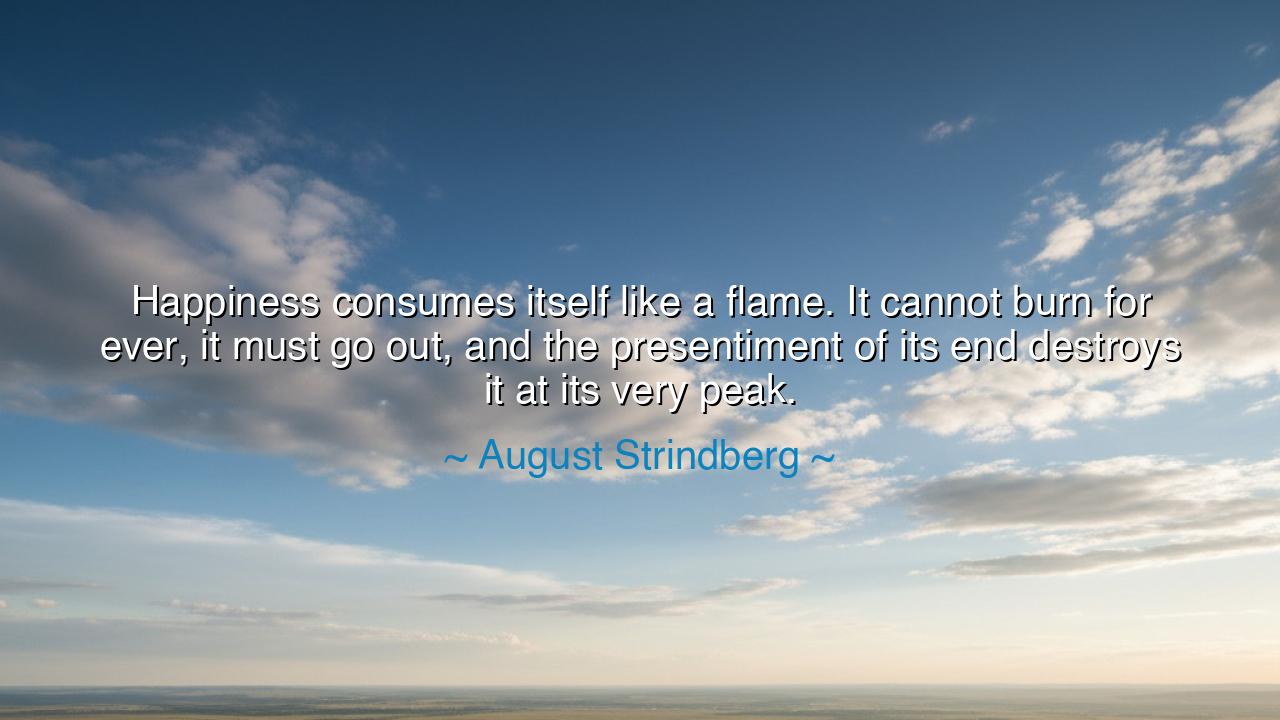
Happiness consumes itself like a flame. It cannot burn for ever
Happiness consumes itself like a flame. It cannot burn for ever, it must go out, and the presentiment of its end destroys it at its very peak.






The dramatist and philosopher August Strindberg, whose soul burned with the restlessness of truth, once wrote: “Happiness consumes itself like a flame. It cannot burn forever, it must go out, and the presentiment of its end destroys it at its very peak.” In this haunting reflection, Strindberg captures one of the most profound paradoxes of human existence—the fleeting nature of joy, and the sorrow that often shadows it. His words remind us that happiness, like fire, is both radiant and fragile. It gives warmth and light, but by its very nature, it consumes the fuel that sustains it. The brighter it burns, the sooner it fades.
The origin of this insight lies in Strindberg’s own turbulent life. A man of great genius and greater torment, he experienced both the ecstasy of creation and the agony of despair. His relationships, his fame, his moments of success—all burned intensely, and each left him scorched by loss. He knew that happiness, when held too tightly, begins to tremble in one’s grasp. For as soon as the heart becomes aware of its joy, it also becomes aware of how fragile that joy is. The mind, in fearing the loss of happiness, hastens its end. Thus, as Strindberg warns, it is often not the absence of joy that ruins us, but our inability to dwell in it without the fear of its extinction.
This truth is as old as the dawn. The ancient Greeks, too, spoke of the transience of human bliss. They told of Icarus, who, carried by wings of wax, soared too close to the sun, intoxicated by his flight. His happiness, brilliant and fiery, was consumed in an instant. The same light that lifted him up melted his wings and cast him down into the sea. So it is with many souls who reach the summit of joy: in the very moment of their triumph, they glimpse the shadow of loss. To fly is glorious—but to know one must soon fall is unbearable. Thus, as Strindberg laments, the presentiment of the end—the intuition that joy cannot last—often destroys the purity of the moment before it truly fades.
Yet Strindberg’s words are not meant to drive us to despair. They are an awakening, a call to understand the nature of happiness not as something permanent, but as something to be experienced and released, like the passing flame of a candle. The wise do not cling to joy as though it were eternal; they honor it, cherish it, and then let it go. To love a moment for its beauty, even knowing it will end, is to live with depth. The ancients of the East knew this well. The Buddha taught that attachment is the root of suffering—that the attempt to hold onto pleasure only turns it to pain. True peace, he said, is found not in the endless pursuit of happiness, but in the acceptance of its impermanence.
Consider the story of Prince Siddhartha, who would become the Buddha. Surrounded by luxury, he tasted every delight the world could offer—music, feasts, and affection—but he found no lasting happiness. Each joy was followed by emptiness, each pleasure shadowed by fear of loss. It was only when he left behind his palace and sat beneath the Bodhi tree, embracing both joy and sorrow as part of life’s natural rhythm, that he found enlightenment. His flame no longer consumed itself; it became steady and eternal—a light born not from passion, but from wisdom.
From Strindberg’s perspective, this is the lesson: the flame of happiness is not meant to burn without end. Its purpose is not to last forever, but to illuminate our path for a while—to warm us, to remind us of beauty, and then to pass, leaving behind the ashes of memory and gratitude. To demand that it last eternally is to demand that fire not consume its fuel—that joy remain without change. But life itself is change, and in change lies both its pain and its wonder. Thus, the wise do not curse the fading of joy; they see in it the perfection of nature’s design.
So, my child, take this wisdom into your heart: when happiness comes, do not clutch it in fear, but let it flow through you like light through glass. Be grateful for its warmth, but do not grieve when it departs, for it will return again in another form. Learn to see beauty in the rise and the fall, in the burning and the cooling. Do not let the fear of the end destroy the sweetness of the present. For though the flame must die, the warmth it gives endures in the soul that has learned to cherish it.
Thus, Strindberg’s words become not a dirge, but a hymn: that life’s greatest joys are precious precisely because they are brief. Like the flame that flickers and fades, they remind us to live fully, love deeply, and let go gracefully. To accept the impermanence of happiness is to discover something greater—the serenity that does not burn, but glows eternal within the heart.






AAdministratorAdministrator
Welcome, honored guests. Please leave a comment, we will respond soon